|
|
|

"BBC 1. Now here's Doctor Who"
|
| The First Doctor |
William Hartnell |
1963-1966 |
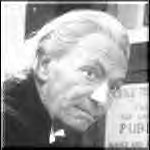 Doctor Who was created in early 1963 by Sydney
Newman and Donald Wilson. Intended as a children's show, which would
combine "an exciting adventure in time and space" with educational
content about science and history, it soon became popular with
adults as well. When the program debuted, on Saturday, November 23,
1963, it starred William Hartnell as The Doctor, a mysterious
traveler in time and space. Hartnell was known for his tough
sergeant roles in films and on TV, including a long-running role in
the popular series The Army Game. He'd also played the sad
old man who befriended Richard Harris's football player in Lindsay
Anderson's film, This Sporting Life, and it was this part
which won him the role of The Doctor. As played by Hartnell, The
Doctor was a crotchety old man who'd been stranded in 1963 while
trying to repair his time machine, the TARDIS. Susan, his
granddaughter, was attending school, and two of her teachers became
curious about her extensive knowledge of some subjects and her
total ignorance of others. They followed her one evening and found
her "home" was a police telephone call box sitting in a junkyard, a
police box which was bigger inside than out. They were further
alarmed when The Doctor, fearing that they'd tell their friends
about the amazing things they'd seen, decided they could not be
allowed to leave, and set his TARDIS in motion. The four travelers
landed on prehistoric Earth and became involved with a tribe which
had lost the secret of fire. From these humble beginnings a legend
was born. The second story introduced the Daleks, an alien menace
which came back to haunt The Doctor throughout his lives, and whose
instant popularity ensured the show's early success. The First
Doctor's stories alternated between costume dramas set in Earth's
past, and science fiction stories, which usually took place on alien
worlds. Doctor Who was created in early 1963 by Sydney
Newman and Donald Wilson. Intended as a children's show, which would
combine "an exciting adventure in time and space" with educational
content about science and history, it soon became popular with
adults as well. When the program debuted, on Saturday, November 23,
1963, it starred William Hartnell as The Doctor, a mysterious
traveler in time and space. Hartnell was known for his tough
sergeant roles in films and on TV, including a long-running role in
the popular series The Army Game. He'd also played the sad
old man who befriended Richard Harris's football player in Lindsay
Anderson's film, This Sporting Life, and it was this part
which won him the role of The Doctor. As played by Hartnell, The
Doctor was a crotchety old man who'd been stranded in 1963 while
trying to repair his time machine, the TARDIS. Susan, his
granddaughter, was attending school, and two of her teachers became
curious about her extensive knowledge of some subjects and her
total ignorance of others. They followed her one evening and found
her "home" was a police telephone call box sitting in a junkyard, a
police box which was bigger inside than out. They were further
alarmed when The Doctor, fearing that they'd tell their friends
about the amazing things they'd seen, decided they could not be
allowed to leave, and set his TARDIS in motion. The four travelers
landed on prehistoric Earth and became involved with a tribe which
had lost the secret of fire. From these humble beginnings a legend
was born. The second story introduced the Daleks, an alien menace
which came back to haunt The Doctor throughout his lives, and whose
instant popularity ensured the show's early success. The First
Doctor's stories alternated between costume dramas set in Earth's
past, and science fiction stories, which usually took place on alien
worlds.
William Hartnell's co-stars: Carole Ann Ford
as Susan Foreman, William Russell as Ian Chesterton, Jacqueline Hill
as Barbara Wright, Maureen O'Brien as Vicki, Peter Purves as Steven
Taylor, Adrienne Hill as Katarina, Jean Marsh as Sara Kingdom,
Jackie Lane as Dodo Chaplet, Anneke Wills as Polly, and Michael Craze as Ben Jackson
|
| The Second Doctor |
Patrick Troughton |
1966-1969 |
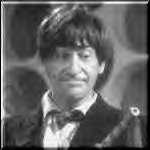 When William Hartnell left the show in 1966 the production
team hit on an amazing idea. Rather than recasting the role with a
similar actor, they decided that the next Doctor, while retaining
the same intelligence and curiosity, would have a different physical
appearance and personality. They chose Patrick Troughton as the new
Doctor, and his success in the role paved the way for the nine other
actors who would assume the part. Troughton, a popular character
actor known for roles in Laurence Olivier's Shakespeare films, and
for his appearances in several Hammer horror classics, played The
Doctor until 1969, fighting an array of menaces which included the
Cybermen, Yeti, and Ice Warriors. His second story, The
Highlanders, was the last of the recurring historical stories.
As Troughton's era neared its end, it was decided that his successor
would spend much of his time on Earth. To pave the way for this
change in the show's format, The Invasion introduced the
United Nations Intelligence Taskforce, a paramilitary group
commanded by Brigadier Alistair Lethbridge-Stewart, which had been
formed to combat alien menaces. In Troughton's final story, The
War Games, the audience learned that The Doctor was a fugitive
from his own people, the Time Lords, who had left his home planet,
in part because he wanted to take an active role in a universe which
the other Time Lords were content merely to observe. As punishment
for his interference in the affairs of others, the Time Lords exiled
The Doctor to Earth in the latter half of the 20th century, and
caused him to change his appearance again. When William Hartnell left the show in 1966 the production
team hit on an amazing idea. Rather than recasting the role with a
similar actor, they decided that the next Doctor, while retaining
the same intelligence and curiosity, would have a different physical
appearance and personality. They chose Patrick Troughton as the new
Doctor, and his success in the role paved the way for the nine other
actors who would assume the part. Troughton, a popular character
actor known for roles in Laurence Olivier's Shakespeare films, and
for his appearances in several Hammer horror classics, played The
Doctor until 1969, fighting an array of menaces which included the
Cybermen, Yeti, and Ice Warriors. His second story, The
Highlanders, was the last of the recurring historical stories.
As Troughton's era neared its end, it was decided that his successor
would spend much of his time on Earth. To pave the way for this
change in the show's format, The Invasion introduced the
United Nations Intelligence Taskforce, a paramilitary group
commanded by Brigadier Alistair Lethbridge-Stewart, which had been
formed to combat alien menaces. In Troughton's final story, The
War Games, the audience learned that The Doctor was a fugitive
from his own people, the Time Lords, who had left his home planet,
in part because he wanted to take an active role in a universe which
the other Time Lords were content merely to observe. As punishment
for his interference in the affairs of others, the Time Lords exiled
The Doctor to Earth in the latter half of the 20th century, and
caused him to change his appearance again.
Patrick Troughton's co-stars: Anneke Wills as Polly, Michael Craze as
Ben, Frazer Hines as Jamie McCrimmon, Deborah Watling as Victoria
Waterfield, Wendy Padbury as Zoe Herriot, Nicholas Courtney as
Brigadier Lethbridge-Stewart, and John Levene as Corporal
Benton
|
| The Third Doctor |
Jon Pertwee |
1970-1974 |
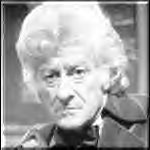 The Doctor's next regeneration was played by Jon
Pertwee, who was perhaps best known for his long-running radio
series The Navy Lark, and for his appearances in the Carry
On films. The Third Doctor spent much of his time helping UNIT
battle a variety of menaces, including the Silurians, the Sea
Devils, the Autons, the Sontarans, and most importantly, another
renegade Time Lord known as The Master, a former friend of The
Doctor who would become his greatest single adversary. In contrast
to his predecessors, The Third Doctor was a man of action, a
characterization which reflected Pertwee's own interests. This
Doctor was as likely to defeat his enemies with exotic martial arts
or swordplay as he was to outwit them. He dressed in a flamboyant
style, and was fond of fast vehicles and fine food and drink. He
also suffered fools even less gladly than the previous Doctors.
Perhaps as a way of reassuring himself that his exile wouldn't last
forever, he delighted in mentioning historical figures and events
he'd been involved with. Following The Three Doctors, an
adventure in which he and his earlier incarnations preserved the
power of the Time Lords, The Doctor's sentence of exile was
rescinded. Although he enjoyed his new freedom, The Doctor continued
to work with UNIT on a regular basis until the end of Pertwee's run
in 1974. The Doctor's next regeneration was played by Jon
Pertwee, who was perhaps best known for his long-running radio
series The Navy Lark, and for his appearances in the Carry
On films. The Third Doctor spent much of his time helping UNIT
battle a variety of menaces, including the Silurians, the Sea
Devils, the Autons, the Sontarans, and most importantly, another
renegade Time Lord known as The Master, a former friend of The
Doctor who would become his greatest single adversary. In contrast
to his predecessors, The Third Doctor was a man of action, a
characterization which reflected Pertwee's own interests. This
Doctor was as likely to defeat his enemies with exotic martial arts
or swordplay as he was to outwit them. He dressed in a flamboyant
style, and was fond of fast vehicles and fine food and drink. He
also suffered fools even less gladly than the previous Doctors.
Perhaps as a way of reassuring himself that his exile wouldn't last
forever, he delighted in mentioning historical figures and events
he'd been involved with. Following The Three Doctors, an
adventure in which he and his earlier incarnations preserved the
power of the Time Lords, The Doctor's sentence of exile was
rescinded. Although he enjoyed his new freedom, The Doctor continued
to work with UNIT on a regular basis until the end of Pertwee's run
in 1974.
Jon Pertwee's co-stars: Nicholas Courtney as
Brigadier Lethbridge-Stewart, Caroline John as Liz Shaw, John Levene
as Sgt. Benton, Katy Manning as Jo Grant, Richard Franklin as Capt.
Mike Yates, and Elisabeth Sladen as Sarah Jane Smith
|
| The Fourth Doctor |
Tom Baker |
1974-1981 |
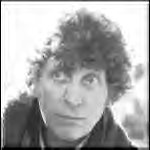 The Fourth Doctor, played by Tom Baker, was the
longest-running and arguably the most popular of all the Doctors.
His previous credits included the role of Rasputin in Nicholas
and Alexandra, and an appearance in The Golden Voyage of
Sinbad which earned him the role of The Doctor. If you ask
casual viewers of the series to describe The Doctor, there's a good
chance they'll choose this incarnation. With his height, curly hair,
toothy grin, and his incredibly long scarf, The Fourth Doctor was
the most visually imposing of them all. During the Tom Baker era the
audience learned a great deal more about the Time Lords. They also
saw the origin of the Daleks, and met their creator, Davros, the
sole threat to The Master's status as the show's most memorable
single villain. The Fourth Doctor's stories introduced a host of new
foes, few of whom would return in later years. When this Doctor
stopped his enemies, it was usually a decisive defeat. Aside from
Davros, the only major new adversary to return in later years was
the Black Guardian, a cosmic force of evil whom The Doctor
encountered during his quest for a powerful artifact called the Key
to Time. Tom Baker's whimsical sense of humor and unpredictability
also restored the alien feel of The Doctor, which had been somewhat
less prominent during the character's exile. The Fourth Doctor, played by Tom Baker, was the
longest-running and arguably the most popular of all the Doctors.
His previous credits included the role of Rasputin in Nicholas
and Alexandra, and an appearance in The Golden Voyage of
Sinbad which earned him the role of The Doctor. If you ask
casual viewers of the series to describe The Doctor, there's a good
chance they'll choose this incarnation. With his height, curly hair,
toothy grin, and his incredibly long scarf, The Fourth Doctor was
the most visually imposing of them all. During the Tom Baker era the
audience learned a great deal more about the Time Lords. They also
saw the origin of the Daleks, and met their creator, Davros, the
sole threat to The Master's status as the show's most memorable
single villain. The Fourth Doctor's stories introduced a host of new
foes, few of whom would return in later years. When this Doctor
stopped his enemies, it was usually a decisive defeat. Aside from
Davros, the only major new adversary to return in later years was
the Black Guardian, a cosmic force of evil whom The Doctor
encountered during his quest for a powerful artifact called the Key
to Time. Tom Baker's whimsical sense of humor and unpredictability
also restored the alien feel of The Doctor, which had been somewhat
less prominent during the character's exile.
Tom Baker's
co-stars: Elisabeth Sladen as Sarah Jane, Ian Marter as
Surgeon-Lieutenant Harry Sullivan, Nicholas Courtney as Brigadier
Lethbridge-Stewart, John Levene as Sgt. Benton, Louise Jameson as
Leela, John Leeson and David Brierley as the voice of K-9, Mary Tamm
and Lalla Ward as Romana, Matthew Waterhouse as Adric, Sarah Sutton
as Nyssa, and Janet Fielding as Tegan Jovanka
|
| The Fifth Doctor |
Peter Davison |
1982-1984 |
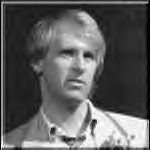 Baker's successor, Peter Davison, the second youngest actor to
assume the role in the series, did a remarkable job of combining the
indecisiveness and enthusiasm of youth with the wisdom of age. The
actor was well-known for his role as the young vet Tristan in the
long-running series All Creatures Great and Small, as well as
appearances in several popular situation comedies. The Fifth
Doctor's victories were usually earned at great cost, including the
first death of a traveling companion since the Hartnell era. The
Fifth Doctor encountered enemies, such as the Silurians, the Sea
Devils, the Black Guardian, and allies, including Susan and the
Brigadier, who hadn't been seen in many years. The Davison years saw
the return of the historical story, and, as with Tom Baker's final
season, an effort was made to link one adventure with the next, an
idea which had been largely abandoned after the Troughton era. The
Fifth Doctor's stories included the program's 20th anniversary
special, The Five Doctors, which saw the returns of Patrick
Troughton and Jon Pertwee, the appearance of Richard Hurndall as The
First Doctor (William Hartnell died in 1975), and in footage from an
incomplete story, Shada, a brief appearance by The Fourth
Doctor (Tom Baker, citing his relatively recent departure, declined
to return). The Davison stories generally succeeded in returning the
series to the more serious tone of its earlier days, which was
largely lost during the later seasons of his predecessor's
era. Baker's successor, Peter Davison, the second youngest actor to
assume the role in the series, did a remarkable job of combining the
indecisiveness and enthusiasm of youth with the wisdom of age. The
actor was well-known for his role as the young vet Tristan in the
long-running series All Creatures Great and Small, as well as
appearances in several popular situation comedies. The Fifth
Doctor's victories were usually earned at great cost, including the
first death of a traveling companion since the Hartnell era. The
Fifth Doctor encountered enemies, such as the Silurians, the Sea
Devils, the Black Guardian, and allies, including Susan and the
Brigadier, who hadn't been seen in many years. The Davison years saw
the return of the historical story, and, as with Tom Baker's final
season, an effort was made to link one adventure with the next, an
idea which had been largely abandoned after the Troughton era. The
Fifth Doctor's stories included the program's 20th anniversary
special, The Five Doctors, which saw the returns of Patrick
Troughton and Jon Pertwee, the appearance of Richard Hurndall as The
First Doctor (William Hartnell died in 1975), and in footage from an
incomplete story, Shada, a brief appearance by The Fourth
Doctor (Tom Baker, citing his relatively recent departure, declined
to return). The Davison stories generally succeeded in returning the
series to the more serious tone of its earlier days, which was
largely lost during the later seasons of his predecessor's
era.
Peter Davison's co-stars: Matthew Waterhouse as
Adric, Sarah Sutton as Nyssa, Janet Fielding as Tegan, Mark
Strickson as Turlough, Gerald Flood as the voice of Kamelion, and
Nicola Bryant as Perpugilliam (Peri) Brown
|
| The Sixth Doctor |
Colin Baker |
1984-1986 |
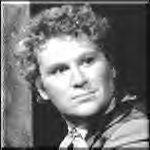 When Davison left the program in 1984, he was
replaced by Colin Baker, who would prove to be the most
controversial Doctor ever. Baker, who was well-known for his role in
the popular soap opera The Brothers, had previously appeared
in the series in the Davison story Arc of Infinity. The Sixth
Doctor never seemed to stabilize after his regeneration, and
suffered from frequent mood swings. This era introduced another
renegade Time Lord, The Rani, and included the only accidental
meeting of two Doctors (with Pat Troughton's final appearance as The
Second Doctor; the beloved actor died in 1987). The audience never
quite knew what to expect from The Sixth Doctor, which reinforced
the character's alien nature. This rather daring version of The
Doctor alienated some of the program's fans, and many of its casual
viewers. It also proved unpopular with BBC management, who placed
the show on hiatus for 18 months after Baker's first full season. It
returned in 1986 with a 14-part story, The Trial of a Time
Lord, which reflected the show's uncertain future. While the
ratings ensured that the series would return in 1987, the BBC chose
to replace Colin Baker in the role. When Davison left the program in 1984, he was
replaced by Colin Baker, who would prove to be the most
controversial Doctor ever. Baker, who was well-known for his role in
the popular soap opera The Brothers, had previously appeared
in the series in the Davison story Arc of Infinity. The Sixth
Doctor never seemed to stabilize after his regeneration, and
suffered from frequent mood swings. This era introduced another
renegade Time Lord, The Rani, and included the only accidental
meeting of two Doctors (with Pat Troughton's final appearance as The
Second Doctor; the beloved actor died in 1987). The audience never
quite knew what to expect from The Sixth Doctor, which reinforced
the character's alien nature. This rather daring version of The
Doctor alienated some of the program's fans, and many of its casual
viewers. It also proved unpopular with BBC management, who placed
the show on hiatus for 18 months after Baker's first full season. It
returned in 1986 with a 14-part story, The Trial of a Time
Lord, which reflected the show's uncertain future. While the
ratings ensured that the series would return in 1987, the BBC chose
to replace Colin Baker in the role.
Colin Baker's co-stars: Nicola Bryant as Peri, Lynda Bellingham as The
Inquisitor, Michael Jayston as The Valeyard, and Bonnie Langford as
Melanie Bush
|
| The Seventh Doctor |
Sylvester McCoy |
1987-1989 |
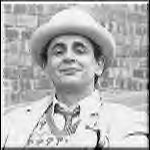 Sylvester McCoy's credits before he was chosen as The
Seventh Doctor included The Secret Policeman's Other Ball and
the Frank Langella version of Dracula. The Seventh Doctor
began as a clownish figure, somewhat similar to Pat Troughton's
Doctor, which fit in with McCoy's reputation as an outlandish stage
comedian, known for such stunts as stuffing ferrets down his
trousers. As The Doctor settled into this new regeneration, however,
the audience discovered that this was the darkest and most
mysterious Doctor yet. The Doctor's origins became a question mark
again, with hints that he was a much more important and powerful
figure than had been previously believed. He took care of
"unfinished business" with the Daleks and Cybermen, attempting to
end their menaces once and for all. The Doctor's latest companion,
the misfit teenager Ace, was given considerably more character
development than most of her predecessors, with several of the
stories revolving around her. The Doctor seemed to be testing Ace,
manipulating her in preparation for an unknown destiny. Sadly, the
results of this subplot were never to be seen on screen. Faced with
rising production costs and declining ratings, the BBC chose to
cancel Doctor Who, and the program's final regular episode
was broadcast on December 6, 1989. Sylvester McCoy's credits before he was chosen as The
Seventh Doctor included The Secret Policeman's Other Ball and
the Frank Langella version of Dracula. The Seventh Doctor
began as a clownish figure, somewhat similar to Pat Troughton's
Doctor, which fit in with McCoy's reputation as an outlandish stage
comedian, known for such stunts as stuffing ferrets down his
trousers. As The Doctor settled into this new regeneration, however,
the audience discovered that this was the darkest and most
mysterious Doctor yet. The Doctor's origins became a question mark
again, with hints that he was a much more important and powerful
figure than had been previously believed. He took care of
"unfinished business" with the Daleks and Cybermen, attempting to
end their menaces once and for all. The Doctor's latest companion,
the misfit teenager Ace, was given considerably more character
development than most of her predecessors, with several of the
stories revolving around her. The Doctor seemed to be testing Ace,
manipulating her in preparation for an unknown destiny. Sadly, the
results of this subplot were never to be seen on screen. Faced with
rising production costs and declining ratings, the BBC chose to
cancel Doctor Who, and the program's final regular episode
was broadcast on December 6, 1989.
Sylvester McCoy's co-stars: Bonnie Langford as Melanie, Sophie Aldred as Ace
|
| The Eighth Doctor |
Paul McGann |
1996 |
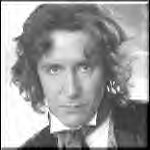 Aside from 1993's Dimensions in Time, an
out-of-continuity story produced for charity in which all of the
surviving Doctors appeared, and an anniversary documentary, 30
Years in the TARDIS, The Doctor's televised adventures
seemed to have ended. Finally, after years of rumors and false
hopes, production began on a made-for-TV movie. This film, Doctor
Who, shown in May 1996, featured a brief return by McCoy, who
soon regenerated into The Eighth Doctor, played by Paul McGann.
Perhaps best known at the time for his role in the cult film Withnail and
I, McGann's more recent credits include appearances in Queen of the Damned and in two of the Hornblower TV movies, shown in the United States on A&E. While the TV movie paid tribute to much of the
history of Doctor Who, it was perhaps most greatly influenced by The Third
Doctor's era. (Sadly, Jon Pertwee died within a week of its
broadcast.) The Eighth Doctor shocked long-term fans by revealing
that he was half human, and by kissing the attractive surgeon who
had inadvertently caused his regeneration (the previous Doctors were
not romantic heroes). Despite fine performances by McGann, Daphne
Ashbrook as Dr. Grace Holloway, and Eric Roberts as The Master, the
movie wasn't the success that had been hoped for. It received
respectable ratings in Britain and elsewhere, but was considered a
failure by its American co-producers, and hopes for a revival of the
series were again in limbo. Aside from 1993's Dimensions in Time, an
out-of-continuity story produced for charity in which all of the
surviving Doctors appeared, and an anniversary documentary, 30
Years in the TARDIS, The Doctor's televised adventures
seemed to have ended. Finally, after years of rumors and false
hopes, production began on a made-for-TV movie. This film, Doctor
Who, shown in May 1996, featured a brief return by McCoy, who
soon regenerated into The Eighth Doctor, played by Paul McGann.
Perhaps best known at the time for his role in the cult film Withnail and
I, McGann's more recent credits include appearances in Queen of the Damned and in two of the Hornblower TV movies, shown in the United States on A&E. While the TV movie paid tribute to much of the
history of Doctor Who, it was perhaps most greatly influenced by The Third
Doctor's era. (Sadly, Jon Pertwee died within a week of its
broadcast.) The Eighth Doctor shocked long-term fans by revealing
that he was half human, and by kissing the attractive surgeon who
had inadvertently caused his regeneration (the previous Doctors were
not romantic heroes). Despite fine performances by McGann, Daphne
Ashbrook as Dr. Grace Holloway, and Eric Roberts as The Master, the
movie wasn't the success that had been hoped for. It received
respectable ratings in Britain and elsewhere, but was considered a
failure by its American co-producers, and hopes for a revival of the
series were again in limbo.
|
| Interim |
1997-2005 |
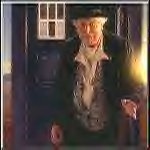 While fans awaited the return of an ongoing series of
television adventures, a few important events indicated that The Doctor hadn't entirely disappeared from the small screen. A
comedy special, Doctor Who and the Curse of Fatal Death, produced for Red Nose
Day 1999, the annual British Comic Relief telethon, starred
Rowan Atkinson as The Ninth Doctor and Jonathan Pryce as The Master,
and featured the Daleks, with appearances by Richard E. Grant, Jim
Broadbent, Hugh Grant, and Joanna Lumley as the Tenth through
Thirteenth Doctors. In November 1999, BBC 2 devoted an evening to
the series. Who Night, hosted by Tom Baker, included
interviews, documentaries, comedy sketches, an episode of the first
Dalek story, and a broadcast of the McGann film. This was followed
by a brief run of adventures from the Pertwee and Tom Baker eras. In
addition to the specials and reruns on TV, there were also audio adventures by
Big Finish Productions, who started
an ongoing series with Peter Davison, Colin Baker, Sylvester McCoy and Paul
McGann, along with other members of the original series cast. In 2001 and 2002,
Internet adventures joined the mix when the BBC produced semi-animated stories
for website broadcast. These included Death Comes To Time
featuring Sylvester McCoy and Sophie Aldred,
Real
Time with Colin Baker, and a remake of
Shada
with Paul McGann as The Doctor (Tom Baker, the Doctor in the original,
unfinished Shada, had declined to appear). In late 2003, the BBC
announced the casting of a new Doctor, the above mentioned Richard E. Grant, for
a planned series of fully animated adventures to be broadcast online. The first
adventure, Scream
of the Shalka, was shown on the BBC website starting in November 2003.
That same month, Doctor Who Magazine ran a story about a new
television series being commissioned by BBC 1, but it wasn't until March
2004 that the BBC announced the casting of Christopher Eccleston as The Ninth Doctor
for the new series. While fans awaited the return of an ongoing series of
television adventures, a few important events indicated that The Doctor hadn't entirely disappeared from the small screen. A
comedy special, Doctor Who and the Curse of Fatal Death, produced for Red Nose
Day 1999, the annual British Comic Relief telethon, starred
Rowan Atkinson as The Ninth Doctor and Jonathan Pryce as The Master,
and featured the Daleks, with appearances by Richard E. Grant, Jim
Broadbent, Hugh Grant, and Joanna Lumley as the Tenth through
Thirteenth Doctors. In November 1999, BBC 2 devoted an evening to
the series. Who Night, hosted by Tom Baker, included
interviews, documentaries, comedy sketches, an episode of the first
Dalek story, and a broadcast of the McGann film. This was followed
by a brief run of adventures from the Pertwee and Tom Baker eras. In
addition to the specials and reruns on TV, there were also audio adventures by
Big Finish Productions, who started
an ongoing series with Peter Davison, Colin Baker, Sylvester McCoy and Paul
McGann, along with other members of the original series cast. In 2001 and 2002,
Internet adventures joined the mix when the BBC produced semi-animated stories
for website broadcast. These included Death Comes To Time
featuring Sylvester McCoy and Sophie Aldred,
Real
Time with Colin Baker, and a remake of
Shada
with Paul McGann as The Doctor (Tom Baker, the Doctor in the original,
unfinished Shada, had declined to appear). In late 2003, the BBC
announced the casting of a new Doctor, the above mentioned Richard E. Grant, for
a planned series of fully animated adventures to be broadcast online. The first
adventure, Scream
of the Shalka, was shown on the BBC website starting in November 2003.
That same month, Doctor Who Magazine ran a story about a new
television series being commissioned by BBC 1, but it wasn't until March
2004 that the BBC announced the casting of Christopher Eccleston as The Ninth Doctor
for the new series.
|
| The Ninth Doctor |
Christopher Eccleston |
2005 |
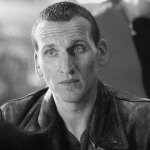 BBC Worldwide, which had the rights to do a movie but
which had not used them, agreed to let BBC 1 Controller Lorraine Heggessey do the series she had been waiting to do.
The new series would be produced at BBC Wales, with Russell T. Davies, Julie Gardner and Mal Young as executive
producers. On Saturday, March 26, 2005, British Who fans were treated to the sight of ordinary shopgirl Rose Tyler going
about her day until the shop window dummies come to life and try to kill her. A guy in a leather jacket seems to
know what to do, and so The Ninth Doctor, as played by Christopher Eccleston, was introduced to a new generation
of fans. Eccleston, who had a strong reputation in drama, had also worked with Russell T. Davies on The Second Coming. His Doctor seemed to bring back some of the humor of the Fourth Doctor, but with a dark, brooding edge. Through The Ninth Doctor, we learn that Gallifrey has been destroyed and he is the last of the Time Lords. While he never admits to his new companion Rose that he is half-human, he is at the same time not
afraid to show his affection for her, and even invites her on board the TARDIS twice before she accepts. Questions
of The Doctor's romantic and sexual nature seem to have finally been answered. BBC Worldwide, which had the rights to do a movie but
which had not used them, agreed to let BBC 1 Controller Lorraine Heggessey do the series she had been waiting to do.
The new series would be produced at BBC Wales, with Russell T. Davies, Julie Gardner and Mal Young as executive
producers. On Saturday, March 26, 2005, British Who fans were treated to the sight of ordinary shopgirl Rose Tyler going
about her day until the shop window dummies come to life and try to kill her. A guy in a leather jacket seems to
know what to do, and so The Ninth Doctor, as played by Christopher Eccleston, was introduced to a new generation
of fans. Eccleston, who had a strong reputation in drama, had also worked with Russell T. Davies on The Second Coming. His Doctor seemed to bring back some of the humor of the Fourth Doctor, but with a dark, brooding edge. Through The Ninth Doctor, we learn that Gallifrey has been destroyed and he is the last of the Time Lords. While he never admits to his new companion Rose that he is half-human, he is at the same time not
afraid to show his affection for her, and even invites her on board the TARDIS twice before she accepts. Questions
of The Doctor's romantic and sexual nature seem to have finally been answered.
Christopher Eccleston's co-stars: Billie Piper as Rose Tyler, Camille Coduri
as Jackie Tyler, Noel Clarke as Mickey Smith, Bruno Langley as Adam, John Barrowman as
Captain Jack Harkness
|
| The Tenth Doctor |
David Tennant |
2005-2009 |
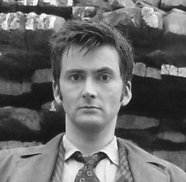 Christopher Eccleston
had signed a one-year contract. As it turned out, David Tennant had been skirting
around the role of The Doctor for quite some time, appearing in Scream of the Shalka and Colditz, as well as Sympathy for the Devil and Exile, two Doctor Who
Unbound adventures by Big Finish. Also, as a subscriber to Doctor Who Magazine
before he got the part, Tennant may have the distinction of being the first
Doctor Who fan to be cast as The Doctor. This incarnation is more comfortable with full-blood humans, while occasionally taking time out to chastise us when he feels we need it. Christopher Eccleston
had signed a one-year contract. As it turned out, David Tennant had been skirting
around the role of The Doctor for quite some time, appearing in Scream of the Shalka and Colditz, as well as Sympathy for the Devil and Exile, two Doctor Who
Unbound adventures by Big Finish. Also, as a subscriber to Doctor Who Magazine
before he got the part, Tennant may have the distinction of being the first
Doctor Who fan to be cast as The Doctor. This incarnation is more comfortable with full-blood humans, while occasionally taking time out to chastise us when he feels we need it.
David Tennant's co-stars: Billie Piper as Rose, Camille Coduri as Jackie, Noel Clarke as Mickey, John Barrowman as Captain Jack, Catherine Tate as Donna Noble, Freema Agyeman as Martha Jones, Adjoa Andoh as Francine Jones, Kylie Minogue as Astrid, Elisabeth Sladen as Sarah Jane, John Leeson as the voice of K-9, Thomas Knight as Luke, Gareth David-Lloyd as Ianto Jones, Eve Myles as Gwen Cooper, Penelope Wilton as Harriet Jones, Jacqueline King as Sylvia Noble, Bernard Cribbins as Wilfred Mott, Alexander Armstrong as the voice of Mr. Smith
|
| The Eleventh Doctor |
Matt Smith |
2009-2013 |
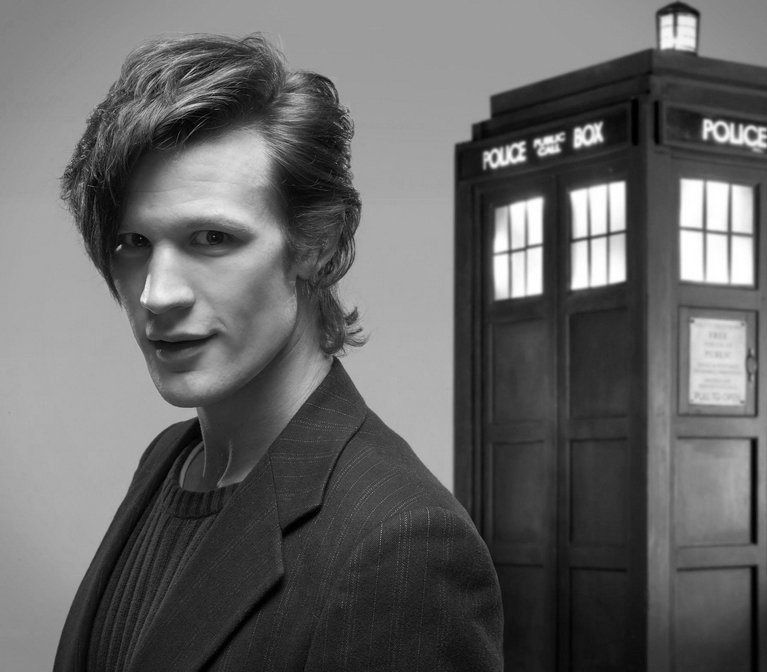 Matt Smith auditioned for the role of the
Eleventh Doctor in early 2009 and Doctor Who Magazine confirmed his casting in issue 405. At age 26, Smith was the youngest actor ever cast as The Doctor, beating previous recordholder Peter Davison by three years. At the same time, Steven Moffat took over as head writer for the series. The Eleventh Doctor is quirky and has had real relationships with some of his companions, relationships like "husband" and "son-in-law." During his tenure, the Weeping Angels came into their own, and new monsters The Silence were introduced. Some truly climactic battles were fought. The TARDIS came alive and later, we were given a guided tour. Through it all, The Doctor remains The Doctor: sometimes mysterious, sometimes egotistical, always compassionate to his companions and the oppressed, always a guardian of time and a force for good. Matt Smith auditioned for the role of the
Eleventh Doctor in early 2009 and Doctor Who Magazine confirmed his casting in issue 405. At age 26, Smith was the youngest actor ever cast as The Doctor, beating previous recordholder Peter Davison by three years. At the same time, Steven Moffat took over as head writer for the series. The Eleventh Doctor is quirky and has had real relationships with some of his companions, relationships like "husband" and "son-in-law." During his tenure, the Weeping Angels came into their own, and new monsters The Silence were introduced. Some truly climactic battles were fought. The TARDIS came alive and later, we were given a guided tour. Through it all, The Doctor remains The Doctor: sometimes mysterious, sometimes egotistical, always compassionate to his companions and the oppressed, always a guardian of time and a force for good.
Matt Smith's co-stars: Karen Gillan as Amy Pond, Arthur Darvill as Rory Williams, Alex Kingston as River Song, Caitlin Blackwood as Amelia Pond, Jenna-Louise Coleman as Clara Oswin Oswald
|
|
|

